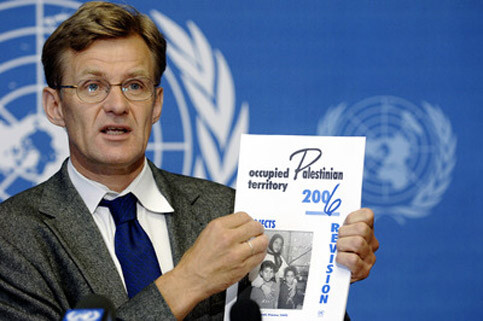United Nations News Service 28 July 2006

Egeland: “Civilians must be protected at any cost. If there are many more dead children in a conflict than armed men, there is something fundamentally wrong, not only with how the armed men behave and where they hide, but also with the way the response is being conducted.” (UN Photo/Jean-Marc Ferre)
The top United Nations aid official today made an urgent appeal for a “humanitarian truce” lasting at least three days between Israel and Hezbollah to allow children, the wounded and the elderly to escape the fighting and food, medicine and other emergency supplies to get through to the conflict zones.
Under-Secretary-General for Humanitarian Affairs and Emergency Relief Coordinator Jan Egeland, who has returned to UN Headquarters in New York from a six-day visit to Lebanon, northern Israel and the Gaza Strip, made his appeal while briefing the Security Council on the deadly and horrific destruction in the region.
“We need at least 72 hours of tranquilities for the sake of the children of Lebanon and northern Israel who, I believe, we all agree are the innocent victims of this escalating conflict,” he told the 15-member body.
“Civilians must be protected at any cost. If there are many more dead children in a conflict than armed men, there is something fundamentally wrong, not only with how the armed men behave and where they hide, but also with the way the response is being conducted.”
He said humanitarian workers were doing all they could to alleviate the suffering but he acknowledged that “aid in itself is not the solution,” and repeated Secretary-General Kofi Annan’s call for an immediate cessation of hostilities, followed by a ceasefire agreement, the deployment of a security force and a political settlement.
In a detailed briefing to the Council, he spoke of the dozens dying every day in Lebanon and said the Health Ministry now puts the civilian death toll at more than 600, adding that “the majority are women and children.” He also outlined the “devastating impact” of the conflict on the civilian population of northern Israel, where hundreds of thousands live in constant fear caused by daily Hezbollah rocket attacks.
Mr. Egeland highlighted the “armed conflict and deepening social and economic crisis in Gaza, and the occupied Palestinian territory as a whole,” saying that 150 people have been killed - a quarter of them children - since the present conflict broke out in June.
Speaking specifically of the Israeli attack on the power plant in Gaza, he said every single transformer had been destroyed, leaving private households, hospitals and water pumps with only three to four hours of electricity supply per day, but this was often “not synchronized with the few hours during which water is being supplied.”
Further on the humanitarian front regarding assistance to Lebanon, two more aid convoys left for the devastated south of the country today, a UN spokesman told reporters. The convoys, organized in cooperation between the world body and the non-governmental organization (NGO) Medecins Sans Frontieres, were sent to Sidon and Jezzine, carrying essentials including food, blankets and shelter materials.
More convoys are planned for the following days, but the availability and rising prices of fuel are issues of growing concern, said the spokesman, noting that fuel prices have increased by 60 per cent because of the conflict.
The World Food Programme (WFP) has also started a humanitarian cargo airlift, which will take temporary warehouses and generators to the region. But as the situation in Lebanon deteriorates, with one in five Lebanese homeless and hostilities continuing, agencies are racing against time.
“There are women and children who face a daily threat not only of shelling and injury, but of having less and less food and water to sustain them. We have no time to waste in reaching them,” warned Amer Daoudi, Emergency Coordinator for the WFP operation in Lebanon. “A greater catastrophe is in the making if we don’t assist people soon.”
The UN High Commissioner for Refugees (UNHCR) reported it is still waiting at the Syrian border with 500 tonnes of emergency relief supplies for more than 20,000 people, although it expects to get access to Lebanon early next week.
The UN Office for the Coordination of Humanitarian Affairs (OCHA) announced that $15 million has so far been received in pledges for the $149 million flash appeal for Lebanon that was launched on Monday, adding that a further $5 million will be made available through the world body’s Central Emergency Response Fund.
Related Links